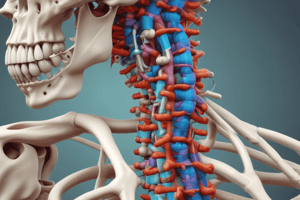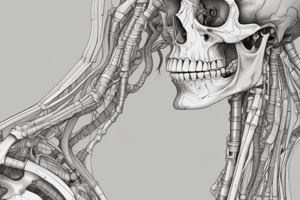Podcast
Questions and Answers
What is the axial skeleton?
What is the axial skeleton?
- Part of the cranium
- Foundation to which the arms and legs are attached (correct)
- Only the vertebral column
- Made up of facial bones only
What is the cranium composed of?
What is the cranium composed of?
4 bones: occiput, temporal bones, parietal bones, frontal bone
What is the posterior portion of the cranium called?
What is the posterior portion of the cranium called?
occiput
Where are the temporal bones located?
Where are the temporal bones located?
What bones lie between the temporal and occipital regions of the cranium?
What bones lie between the temporal and occipital regions of the cranium?
What bone forms the forehead?
What bone forms the forehead?
How many bones make up the facial bones?
How many bones make up the facial bones?
What are the upper, nonmovable jawbones called?
What are the upper, nonmovable jawbones called?
What are the cheekbones referred to as?
What are the cheekbones referred to as?
What is the lower, movable portion of the jaw called?
What is the lower, movable portion of the jaw called?
What are orbits in relation to the skull?
What are orbits in relation to the skull?
Study Notes
Axial Skeleton
- The axial skeleton serves as the structural foundation for the body, providing attachment points for the limbs.
- Composed of four main components: skull, facial bones, thoracic cage, and vertebral column.
Cranium
- Formed by a fusion of several thick bones that create a protective shell for the brain above the eyes.
- Made up of four primary bones: occiput, temporal bones, parietal bones, and frontal bone.
Occiput
- Represents the posterior portion of the cranium, playing a critical role in the skull's structure.
Temporal Bones
- Located laterally on each side of the cranium; commonly known as the temples.
Parietal Bones
- Positioned between the temporal and occipital regions of the cranium, contributing to the skull's protective function.
Frontal Bone
- The bone that constitutes the forehead, providing a barrier for the frontal lobes of the brain.
Facial Bones
- Comprise 14 bones, forming the structure of the face and aiding in functions such as eating and breathing.
- Includes maxillae, zygomas, mandible, orbits, and small bones that create the bridge of the nose.
Maxillae
- Comprised of the upper, nonmovable jawbones, essential for facial structure and dental health.
Zygomas
- Known as the cheekbones, these bones contribute to facial contour and structure.
Mandible
- The lower jaw and only movable bone of the face, playing a crucial role in chewing and speaking.
Orbits
- Also known as eye sockets, formed by the zygomas, maxillae, and frontal bones; housing and protecting the eyes.
Studying That Suits You
Use AI to generate personalized quizzes and flashcards to suit your learning preferences.
Description
Test your understanding of the axial skeleton with these flashcards! This quiz covers key terms and definitions related to the skull, facial bones, thoracic cage, and vertebral column. Play now to reinforce your knowledge of this foundational aspect of human anatomy.




